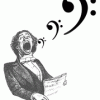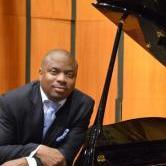Leaderboard
Popular Content
Showing content with the highest reputation on 05/24/2012 in all areas
-
I hate playing favorites, but I'll throw a few names in the hat for fun. Jane Eyre (both) Snow Falling on Cedars Hook. Favorite movie too :smithy: The Green Mile Ararat Crouching Tiger, Hidden Dragon A.I. And I agree with KahliaSkye. Ever After was magical.1 point
-
1 point
-
Then how're you supposed to get better at it? I'm gonna at least give it a go; there's a first time for everything!1 point
-
"a. We compose music for ourselves, we remain true to ourselves and we do not sell out for the sake of anyone (the audience, the publisher, money, or other)." I see this position as a response to an argument that gets thrown around here (rather than a distinction between b.): that because modern music is less popular with audiences, the composers behind it have failed somehow. It is a terrible argument.1 point
-
Oh come on... get real you guys (and gals...). This IS an interesting thread, only that it never came to a conclusion due to silly bickering amongst members... So... a conclusion perhaps, if I may (though others may continue as they please): 1. There IS some good music today, but appear to be: a. Buried underneath loads of garbage floating around today b. Be ignored because it's too good for the audience (and the audience is stupid?!?!?!) c. It missing out because the composer(s) are not doing enough promotion themselves (or their publishers?) 2. There also seems to be a consensus on what needs be done. We should train/educate the audience. We, the composers, or others more fitting than us (but who, I repeat the question which only two replied). 3. There is a disagreement on why we compose music, or rather who we compose music for. There seems to be two camps here: a. We compose music for ourselves, we remain true to ourselves and we do not sell out for the shake of anyone (the audience, the publisher, money, or other). b. We compose to please others and take into account the general publics' opinion!1 point
-
I agree with this. It seems like to me, classical composers neglect technology and therefore sound/timbre itself because it seems more plebeian somehow. Electronic music's focus on sound and the sounds it has produced is really amazing. So you have amazing electronically produced sounds meanwhile high art composers write "hit the side of the piano with your credit card" or some gimmick in the middle of a piece. That comparison is just laughable to me. We need to focus at what acoustic instruments are best at now , ESPECIALLY becasuse we have such amazing electronic sounds available to us. Composers also need to embrace electronic music to execuse their much better understanding of theory, I think.1 point
-
From a purely musical standpoint, I think a good portion of Pop-music is actually very good. The bone I have to pick with Pop is the emphasis it put's on non-musical things; appearance, ability to market the person...or to put it simply how "cool" they are. This is the standard by which the most wide-spread genre's "best" are chosen, and I think it's just disgusting. People who are fantastic musicians/composers are passed over because they don't fit the mold of today's "image". Some of my friends who like Pop have told me that there is no "mold", and that pop artists are always trying to be. And that's just it. That's what the mold is. It's an image where the musician becomes more of a trained monkey than anything; they get up on stage in the most ridiculous outfits (i.e. Lady Gaga, LMFAO) and sing a couple of songs, which are usually never written by them. The only redeeming quality is that they have rhythm, and they can sing, although in this modern age of auto-tune and other more subtle tuning technology, even THAT is sometimes not the case.1 point
-
You need not calculate, but surely at least consider your listeners. Audience popularity a great gauge of emotional and spiritual connection at any particular time for a particular work. And those attributes are surely important to "musical worth." We don't call Beethoven's 9th one of the greatest pieces every written because it didn't have emotional and spiritual connections, because it does, to audiences of all ages.1 point
-
A bold statement indeed. I think the main point in composing is to try and say what we really want to say. But if we're self-referential or autistic and don't really want to communicate anything, what's the point anyway? I'm not saying this is bad in itself. In fact it's OK, we might do whatever we deem proper, as long as we're being authentic and true to ourselves, rather than jumping on a senseless vogue or playing the smart guy. Only that we must temper our expectations. If we don't care about the audience (and performers!), why should they care about us? If we don't give them a worthy experience, they won't give us a second of their attention.1 point
-
This is not bad to say, but don't you feel just a little bit satisfied if somebody likes your music? ;)1 point
-
I'd have to disagree with you on that. For me personally, I've been exposed to a lot of modern music, especially not that I'm a conservatory student. And while I am by no means an expert, I wouldn't say it is my ignorance that causes me to dislike most modernist/avant garde styles; it's just the simple fact that I don't like them, for various reasons. A few of those reasons; I don't understand them, not from a theory perspective (although that is also true at times) but from a "logical listening" one. The "language" of modern music to me seems like gibberish. While a fan of modern music might say that such and such a piece sound beautiful, to me it is complete randomness, that for me seems to have no sense of logic or direction. I don't think it is my lack of knowledge that makes me dislike modern music, but my experience with it. For the most part, the modern music I've heard sounds like madness. There are exceptions of course, but on the whole it doesn't "click" with me. I think it's a valid point. I don't think people are presuming anything as you say. They listen to the music, and based on what they here make a guess on what could have inspired such music. As I said, for me the music sounds random and illogical, so I wonder whether the composer just wrote down random scribblings. Someone else might find the work to be logical, and I would probably ask them to explain, because truthfully I just simply don't understand a lot of modern music, in the sense that I don't understand how anyone could like that, or want to WRITE like that. I don't mean that offensively, I just mean that it's hard for me to see, or rather hear, the same things that modernist fans hear. A question I want to pose to you: I've never heard anyone say that an early Classical work seems illogical, or random (i.e. Haydn, Mozart, or farther back to Salieri, Vivaldi, etc.). However, we hear it all the time about new works. So is it because we haven't yet become adapted to the newer styles, or is it because the styles themselves are inherently "random"? Personally I would say that it is because modern Classical music, or more precisely the method of writing it, has shifted from putting the listener at the center to the composer. I only mean this somewhat literally; early music was built on a system of consonance over dissonance, tonality, and especially form. All these things are clearly recognizable, even to those who only have a minute knowledge of Classical music. However, newer music TENDS to focus on things that we hardly notice in music, and in some cases are impossible to notice, such as pieces written using a particular mathematical formula. Also, today the idea of "dissonance" among modernists has been obliterated. Everything is treated as a consonance, even such "obvious" dissonances as the m2.1 point
-
Of course, there is a whole lot of music which goes beyond the immediate, shallow aural sensation, and time is needed to fully appreciate it (I think about my own experience with Mahler, for instance - and to a lesser extent, with the Rite of Spring, which gave me a headache the first time I heard it). But, on the other hand, regarding to certain works, one might refer to George B. Shaw: "When something is rotten, I don't need to eat the whole of it to prove it's indeed rotten" :toothygrin:.1 point
-
(thanks for the intelligent discussion) About the audience: When it comes to the serialist and post-serialism compositions, it can be argued that the music strips the aural sensation that comes with music over the past five millennium. To disqualify an audience who don't want to hear Webern is reprehensible. Most of the paying audience would rather have a V8. Some of my teachers have said,"Chad, you need to add these techniques. ( i.e. indeterminacy, serialism, numerology, etc.)" I say "Humbug to that, I like Rachmaninoff & Brahms and I'm going to keep writing like that. " So am I wrong? That's a whole new discussion. I'm going to the Louisiana Phil concert this week. Why? This what they are playing: Schoenberg: Chamber Symphony No. 1 Sarmientos: Concertino for Marimba Beethoven: Symphony No. 7 If they were playing "Von heute aug morgen", I wouldn't be going. Even in jazz, I am not going to an Ornette Coleman concert. Heck, even some of the eclectic performances of Herbie and Wayne are not my thing. Kenny Garrett? Wycliffe Gordan, Horace Silver, Robin Eubanks? I'm there. I'll end on this. Ravel said this about Schoenberg (in regards to 12-tone) "Non, ce n'est pas de la musique... c'est du laboratoire" (translation: "That isn't music … it's lab-work") "1 point






